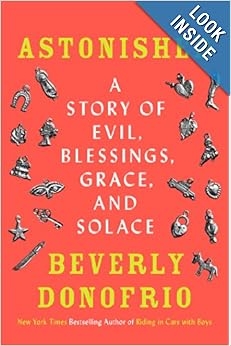Astonished: A story of Evil, Blessings, Grace, and Solace.
by Beverly Donofrio
ISBN: 978-0-670-02575-6
Penguin
US $25.95
CAN $27.50
In an age of mashups, it is no surprise that there are spirituality/religions mashups. But when a memoir is about a person questioning her faith, mashups make it difficult to know which faith or religion is being questioned.
Astonished is a harrowing painfully-honest book about a rape. It is full of questions,and these questions are hard, silly, difficult, or just weird depending on which aspect of her syncretist religion Beverly Donofrio is questioning.
She is primarily a Roman Catholic and thus she understands that Christ has also suffered, but she is a Buddhist and a yoga practitioner as well. In addition, her parental issues --especially with male members of her family-- flavor her Catholicism with a Marian worship. Yet, that honoring and worship of Mary (as the feminine aspect of God) is uncomfortable with the masculine expression of Deity.
A book such as this is a hard read-through for many reasons. Books about rape are painful. As are books about depression and grief. Such books require commitment of heart as well as of mind. And spiritual memoirs will always encounter the spiritual boundaries the reader has set up for herself. But there is something to be said about the author’s bravery at showing her naked self. If Christianity is defined as walking with God and living a transparent life with human beings, Donofrio could be defined as a Christian. Of course, some will argue that that kind of definition is certainly not what Christianity is not. Or possibly that Christianity is that and much more.
But what is one to do about the harrowing rape? It stands squarely in -- and is the sole cause-- of the book. To dismiss the events of the rape because of the funky self-chosen buffet theology is to be unloving.
Donofrio’s is a theology that is rooted in her own self, a spirituality that is one-sided because of that. It also has a very Augustinian Calvinism in that it has an almost fatalistic conception that God controls (or doesn’t control) evil. Only a modern Calvinist would speak of “forgiving God.” Indeed, many of the questions Donofrio asks comes from this confusion of spirituality and certainly would not have been asked if she were more theologically rooted in the Bible. At one point, she writes, “I’ve one friend who thinks I’m a Christian because I’m so desperate to believe in an afterlife, I’m willing to believe a myth-- that Jesus is the son of God sent to die in reparation for Adam’s sin of disobedience. Which then opened the gates of heaven and gave us eternal life.” She then goes on to say that the only part of the myth she believes is that Jesus is the Son of God and that she “believes in karmic law and reincarnation….I refuse to believe that God punished the whole race for Adam’s sin-- or that God punishes ever.”’ This muddled theology which believes that Christianity declares that God punished the whole race (a misunderstanding of the theology of the fall of man) and which believes that God doesn’t punish anyone is just one of many such instances one encounters in Astonished. It shows a buffet spirituality which picks and chooses elements of several religions, without quite being knowledgeable enough to see how the discarded parts and the retained parts are interconnected.
If one would compare the pure white wedding dress given by Christ to His Bride with the self-made patchwork dress of one who supposedly believes. The dress is beautiful and even has patches of white but it is not a true wedding dress.
Those who read religious books have strong opinions rooted in their own theologies or denomination and those who are not religious have their own prejudices against any work that is blatantly religious. Therefore Donofrio is to be commended for bravely discussing both her spirituality and the rape. On the one hand, the theology -- or rather, the many theologies-- in Astonished are so typically narcissistic Hollywood and so self-created and messily syncretist that one cannot call it a Biblical Christianity and there is a dangerous wolf-in-sheep’s clothing quality to it which could taint the spirituality of some readers. This book falls into the category of spiritual memoir and thus those who are lovers of memoirs or are connoisseurs of spiritual journeys will like this book. Those who have endured suffering or had spiritual questions may also like it. Those who understand the richness of Christianity will find it laughable.











No comments:
Post a Comment